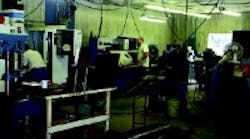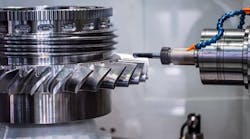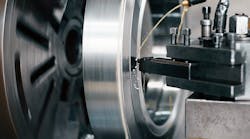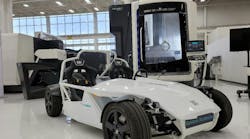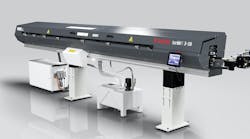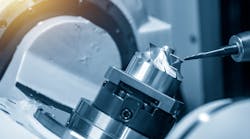Perfect parts and on-time delivery are the name of the game at Turning Inc.
Turning Inc. consists of (left to right) Beth Hostetler, Toby Miller, Nick Miller, Ronnie Blackwell and Brad Coleman.
Turning Inc. has not had a customer return a defective part in more than ten years, and it has not missed a job delivery date since the company opened its doors 22 years ago.
"Jobs are done right and on time," says Toby Miller, president. "If a customer receives a bad part, that gives the shop's image a black-eye, and we can't have that because the bulk of our jobs come from word-of-mouth."
Job volumes vary from one to 10,000 parts, with the average being about 2,000 parts per job. Typical job lead times run 30 days, and the shop fulfils, on average, around 140 purchase orders monthly. Most jobs involve turning, especially small diameters, which the shop specializes in, and parts ranging in size from 0.187 in. to 1.500-in. in diameter. Miller says the key is in-process quality checking that rarely adds to a part's cycle time because it is done during cutting time. In the rare occasions when in-process checking does add to a part's cycle time, Miller says the amount is miniscule as compared with the time the customer would waste shipping back the part and his guys then reworking it.
Turning Inc. is not perfect and sometimes scraps a part, but the shop catches them at the machines, mainly because these are first-run parts used to set up the job. "For the first piece of a job, we adjust the machine offsets out about 0.005 in. so we know the part won't come off undersize. We then check it and re-adjust the offsets accordingly," says Miller. "This may add a little time to cutting the first part, but we are not going to scrap a part just to set up the job."
The shop also focuses on cycle times and uses a lot of fixturing for holding multiple parts. "If we can reduce part cycle times by just 5 percent, that's 5 percent that allows me to keep from having to raise prices so I can remain competitive," says Miller. "We try to never raise prices, so our profits increase solely by doing jobs more efficiently all the time."
Miller says he bases his success on experience, having a skilled staff and keeping abreast of the latest manufacturing technology. "You can't do tomorrow's work on yesterday's equipment," says Miller. And he expects to install the shop's first multitasking millturn machine by next year and will incorporate off-line programming.
Within five years, Miller said he should have two mill-turn machines and will continue to focus heavily on turning jobs. He foresees no problems with keeping the machines supplied with work because the shop is currently operating at full capacity. In fact, the shop is expanding its existing facility this year to avoid having to turn work away.
| Turning Inc. Jasper, Ga. Number of employees — 5 2006 sales — $505,000 and climbing Markets served — Aerospace, automotive , and safety (breathing apparatus for firefighters and U.S. military) |
